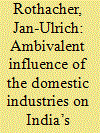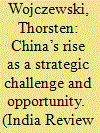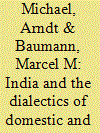|
|
|
Sort Order |
|
|
|
Items / Page
|
|
|
|
|
|
|
| Srl | Item |
| 1 |
ID:
143935


|
|
|
|
|
| Summary/Abstract |
Most of the Indian government’s bi- and multilateral trade initiatives are stuck in political deadlock. At the same time, the unilateral measures are lurching between trade restricting and liberalizing policies. By conducting detailed investigations into the process of the trade policy formulation in three industries, this article seeks to discern the societal pressures that are driving the government’s trade preferences and policies. The empirical results show that the government’s tortuous dealings can be explained by two impulses of the domestic industries that have been emanated by the opening of the economy in the 1990s. Most of the domestic industries—grappling with competition from abroad—will call for some form of protection from the global markets. These compulsions, however, endanger the benefits that other domestic industries derive from the global markets—through the access to intermediate goods, foreign investments or export opportunities. This is why they will militate against protectionist interventions. The outcome is an overall consolidation of the open trade regime, which is, however, frequently upset by spats between different domestic industries over the formulation of trade policies.
|
|
|
|
|
|
|
|
|
|
|
|
|
|
|
|
| 2 |
ID:
143934


|
|
|
|
|
| Summary/Abstract |
The simultaneous rise of China and India is one of the most important developments in contemporary world politics. Given their steadily growing power and aspirations and China’s more assertive posture in Asia, the management of China’s rise is one of the major challenges for India’s foreign policy. However, India is often said to have no guiding strategic framework for its China policy, which is seen as incoherent and reactive. This article, by contrast, shows that India has an evolving China strategy and that the alleged inconsistencies in India’s China policy are rather the result of an ambivalent image of China. Drawing on constructivism and discourse analysis, the article identifies the dominant perception of China in India’s foreign policy discourse and the resulting foreign policy strategy. In a next step, the article analyzes the China policy of the Congress-led UPA Government and investigates whether it conforms to the strategic policy frame of the dominant China discourse.
|
|
|
|
|
|
|
|
|
|
|
|
|
|
|
|
| 3 |
ID:
143937


|
|
|
|
|
| Summary/Abstract |
International land “acquisition” or land “grabbing” has become a global phenomenon in which India plays an increasingly important role. While there is a critical domestic debate regarding land deals within India — especially pertaining to the provisions of the Land Acquisition Act of 2014 — there is practically no such debate regarding international land deals by Indian companies in Sub-Saharan Africa. By applying a two-level discourse analysis, this article argues that the land discourse within India can be understood as a strategy of exclusion. By linking land issues with questions of “development,” the discursive strategies of powerful actors lead to the exclusion of the arguments of NGOs and others opposed to the land deals from the discourse within India. This strategy of exclusion is then taken to the extreme with the strategy of securitization outside India: land deals are linked to “food security,” as the example of Ethiopia highlights.
|
|
|
|
|
|
|
|
|
|
|
|
|
|
|
|
| 4 |
ID:
143939


|
|
|
|
|
| Summary/Abstract |
This article analyzes the continuing interethnic and anti-state violence in Assam, India after the creation of the semi-autonomous Bodoland Territorial Area District (BTAD) in 2003. We argue that this institutional arrangement, as an “innovative” model of ethnofederalism and political autonomy, has been unsuccessful in effectively preventing continued violence. We identify several dynamics resulting from the creation of the BTAD that contribute to its ineffectiveness, including the emergence of parochial and militarized Bodo ruling cliques, competitive radicalization between Bodo political elites competing in insular electoral constituencies, the inability to co-opt and integrate factionalized Bodo militants, reinvigorated non-Bodo activism and communalism, and the increased politicization of land. The extreme and multi-faceted “ethnic” diversity found in India’s Northeast, and its aggressive political expression at the local level, differentiates this region from other parts of India where ethnofederalism has been comparatively more successful for conflict mitigation. Thus, the prospects for successful ethnofederalism are area-specific.
|
|
|
|
|
|
|
|
|
|
|
|
|
|
|
|
| 5 |
ID:
143933


|
|
|
|
|
| Summary/Abstract |
As the dispute over Kashmir broke out in 1947, a plebiscite of the people of the state offered a mutually acceptable and ostensibly fair path out of the imbroglio. Critics have often laid the blame on Nehru, and the territory’s salience to India, for why a plebiscite was never held. Based on primary documentation, this article makes the case that it was not a lack of commitment to the formula, but rather Nehru’s deeply held strategic and reputational fears that motivated, first, the setting of what Delhi saw as firm but fair pre-conditions, and after the conclusion of the US-Pakistan military pact in 1954, the complete rejection of the plebiscite option.
|
|
|
|
|
|
|
|
|
|
|
|
|
|
|
|
| 6 |
ID:
143936


|
|
|
|
|
| Summary/Abstract |
The paper examines if the business sector in India has had a tangible influence on India’s foreign policy. It suggests several factors for which private business failed to have any influence on India’s foreign policy during the first three decades after Independence. It suggests a conceptual typology of the principal drivers of India’s foreign policy, which, according to the author, provides an effective framework for understanding the role of the private sector since it began to wield some influence in the mid-1980s. The paper uses this threefold classification to argue that, in the period from the 1980s to today, contrary to the general perception, the role of the Indian business sector (and especially of industry associations) on India’s foreign policy has been marginal and restricted to some specific sectors.
|
|
|
|
|
|
|
|
|
|
|
|
|
|
|
|
|
|
|
|
|